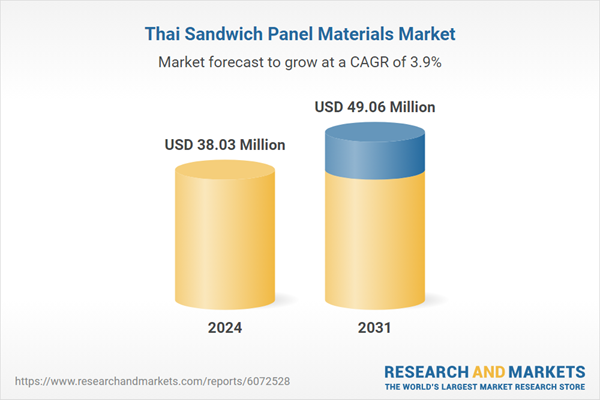Sandwich panels have excellent insulation properties and are becoming the material of choice for constructing cold storage facilities with large refrigeration areas. They are also used to construct warehouses that store sensitive items at a steady temperature. These panels help maintain precise temperature control, which is crucial for preserving perishable goods such as food and pharmaceuticals, thereby reducing spoilage and ensuring product quality. As Thailand continues to expand its agricultural and food processing industries, there is an increasing requirement for modern cold storage facilities to support the storage and transportation of temperature-sensitive products.
Thailand is undergoing rapid urbanization and infrastructure development, leading to an increased need for advanced building materials that offer efficiency and durability. Polyurethane (PU)--based panels have emerged as a preferred choice among builders and contractors owing to their superior thermal insulation, lightweight properties, and versatility in various construction applications. In addition, the versatility of PU panels in various construction applications, including roofing, wall cladding, and cold storage facilities, is driving their demand in the country.
Polyurethane sandwich panels are particularly suitable for buildings that require fire-resistant structures and have varied applications in large industrial plants, garages, mobile houses, exhibition halls, gymnasiums, shopping centers, airports, power plants, hospitals, strata, and high-rise office buildings. These panels are easy to install and offer long-term performance with minimal maintenance. The growing emphasis on modernizing the construction sector in Thailand, coupled with the rising awareness of the benefits of energy-efficient materials, is accelerating the adoption of PU-based composite panels.
The development of fire-resistant sandwich panels is expected to emerge as a significant trend in the Thailand sandwich panel materials market in the coming years. As urbanization continues to expand across the country, there is an increasing emphasis on building safety and sustainability. Fire-resistant sandwich panels, which are engineered with core materials such as mineral wool, polyisocyanurate (PIR), and other noncombustible substances, are gaining traction as a crucial solution to enhance building safety. These panels are designed to withstand high temperatures and prevent the spread of fire, addressing the critical need for improved fire safety in both residential and commercial buildings.
This trend is likely to be further amplified by the enforcement of stricter building codes and regulations across Thailand, which increasingly require the use of fire-resistant materials in new construction projects. As developers and builders prioritize compliance with these regulations, the demand for fire-resistant sandwich panels is expected to grow significantly. Moreover, the dual benefits of these panels - providing superior thermal insulation and soundproofing while ensuring fire safety - make them an attractive choice for numerous applications.
A few key players operating in the Thailand sandwich panel materials market are ROCKWOOL A/S, Dow Inc, BASF SE, Sika AG, Celanese Corp, Covestro AG, Microfiber Industries Ltd, The Steel Public Company Ltd, Daicel Corporation, Nichias Corporation, Insufoam Industries (Samut Sakhon) Co Ltd, and Shandong Minye Refractory Fibre Co Ltd. Players operating in the market are highly focused on developing high-quality and innovative product offerings to fulfill customers' requirements.
The overall Thailand sandwich panel materials market size has been derived using both primary and secondary sources. Exhaustive secondary research has been conducted using internal and external sources to obtain qualitative and quantitative information related to the market. Also, multiple primary interviews have been conducted with industry participants to validate the data and gain more analytical insights into the topic. The participants of this process include industry experts, such as VPs, business development managers, market intelligence managers, and national sales managers - along with external consultants, such as valuation experts, research analysts, and key opinion leaders - specializing in the Thailand sandwich panel materials market.
Reasons to buy:
- Progressive industry trends in the Thailand sandwich panel materials market to help players develop effective long-term strategies
- Business growth strategies adopted by developed and developing markets
- Quantitative analysis of the sandwich panel materials market from 2019 to 2031
- Estimation of the demand for sandwich panel materials across various industries
- Porter's Five Forces analysis illustrates the efficacy of buyers and suppliers operating in the industry to predict market growth
- Recent developments to understand the competitive market scenario and the demand for sandwich panel materials across Thailand
- Market trends and outlook coupled with factors driving and restraining the growth of the sandwich panel materials market
- Decision-making process by understanding strategies that underpin commercial interest concerning the Thailand sandwich panel materials market growth
- The Thailand sandwich panel materials market size at various nodes of the market
- Detailed overview and segmentation of the sandwich panel materials market, as well as its dynamics in the industry
- The sandwich panel materials market size in different regions with promising growth opportunities
Table of Contents
Companies Mentioned
Some of the leading companies in the Thailand Sandwich Panel Materials Market include:- ROCKWOOL A/S
- Dow Inc
- BASF SE
- Sika AG
- Celanese Corp
- Covestro AG
- Microfiber Industries Ltd
- The Steel Public Company Ltd
- Daicel Corporation
- Nichias Corporation
- Insufoam Industries (Samut Sakhon) Co Ltd
- Shandong Minye Refractory Fibre Co Ltd
Table Information
| Report Attribute | Details |
|---|---|
| No. of Pages | 129 |
| Published | April 2025 |
| Forecast Period | 2024 - 2031 |
| Estimated Market Value ( USD | $ 38.03 Million |
| Forecasted Market Value ( USD | $ 49.06 Million |
| Compound Annual Growth Rate | 3.9% |
| Regions Covered | Thailand |
| No. of Companies Mentioned | 13 |









